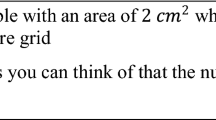Abstract
This reaction to the papers in this PME Special Issue of Educational Studies in Mathematics draws a wider perspective on the issues addressed and some of the constructs used in research in Realistic Mathematics Education (RME). In particular, it tries to show that while the problems addressed existed within the world-wide arena of mathematics education and were not unique to the Dutch educational system, the methods used at the Freudenthal Institute to address them were uniquely adapted to that system yet foreshadowed developments in the wider field of mathematics education. The predictive aspects of mathematizing, didactizing, and guided reinvention, in which models-of become models-for on various levels, resonate with trends in mathematics education in recent years, including those promoted by the National Council of Teachers of Mathematics in the USA. Research methodologies, too, have broadened to include more humanistic qualitative methods. Developmental research as epitomized in the RME tradition makes the distinction between quantitative and qualitative research obsolete, because there is no restriction on research methods that may be useful in investigating how to improve the teaching and learning of mathematics, and in the designing of mathematics curricula. Thus some aspects of this research resonate with what have come to be known as multitiered teaching experiments. However, in RME there is also a special content-oriented didactical approach that harmonizes with an emphasis on didactics (rather than pedagogy)in several other European countries. Some implications are drawn for future research directions.
Similar content being viewed by others
REFERENCES
Bishop, A.J.: 1985, 'The social psychology of mathematics education', in L. Stree-fland (ed.), Proceedings of the Ninth International Conference for the Psychology of Mathematics Education, OW&OC, Utrecht University, Utrecht, Vol. II, pp. 1–13.
De Bono, E.: 1970, Lateral Thinking: A Textbook of Creativity, Pelican, London.
Dörfler, W.: 2000, 'Means for meaning', in P. Cobb, E. Yackel and K. McClain (eds.), Symbolizing and Communicating in Mathematics Classrooms: Perspectives on Discourse, Tools, and Instructional Design, Lawrence Erlbaum Associates, Mahwah, New Jersey, pp. 99–131.
English, L.D.: 2002, 'Priority themes and issues in international research in mathematics education', in L.D. English (ed.), Handbook of International Research in Mathematics Education, Lawrence Erlbaum Associates, Mahwah, New Jersey, pp. 3–15.
Freudenthal, H.: 1973, Mathematics as an Educational Task, Reidel Publishing Company, Dordrecht.
Freudenthal, H.: 1977, 'Antwoord door Prof. Dr H. Freudenthal na het verlenen van het eredoctoraat' [Answer by Prof. Dr H. Freudenthal upon being granted an honorary doctorate], Euclides 52, 336–338.
Freudenthal, H.: 1983, Didactical Phenomenology of Mathematical Structures, Reidel Publishing Company, Dordrecht. 136 NORMA PRESMEG
Gravemeijer, K.: 1994, 'Educational development and developmental research in mathematics education', Journal for Research in Mathematics Education 25(5), 443–471.
Gravemeijer, K.: 1998, 'Developmental research as a research method', in A. Sierpinska and J. Kilpatrick (eds.), Mathematics Education as a Research Domain: A Search for Identity, Kluwer Academic Publishers, Dordrecht, pp. 277–295.
Guilford, J.P.: 1959, 'Traits of creativity', in P.E. Vernon (ed.), Creativity, Penguin, London.
Guilford, J.P.: 1977, Way Beyond the I.Q., Creative Education Foundation, Buffalo, New York.
Guilford, J.P.: 1979, 'Some incubated thoughts on incubation', The Journal of Creative Behavior 13(1), 1–8.
Lesh, R.A. and Kelly, A.E.: 2002, 'Multitiered teaching experiments', in A.E. Kelly and R.A. Lesh (eds.), Handbook of Research Design in Mathematics and Science Education, Lawrence Erlbaum Associates, Mahwah, New Jersey, pp. 197–230.
Presmeg, N.C.: 1980, Albert Einstein's Thought, Creativity, and Mathematical Education, Unpublished M. Ed. Thesis, University of Natal.
Presmeg, N.C.: 1994, 'Cultural mathematics education resources in a graduate course', in J.P. da Ponte and J.F. Matos (eds.), Proceedings of the 18th Conference of the International Group for the Psychology of Mathematics Education, University of Lisbon, Lisbon, Vol. 4, pp. 65–72.
Presmeg, N.C.: 1997, 'A semiotic framework for linking cultural practice and classroom mathematics', in J.A. Dossey, J.O. Swafford, M. Parmantie and A.E. Dossey (eds.), Proceedings of the Nineteenth Annual Meeting of the North American Chapter of the International Group for the Psychology of Mathematics Education, ERIC Clearinghouse for Science, Mathematics, and Environmental Education, Columbus, Ohio, Vol. 1, pp. 151–156.
Presmeg, N.C.: 1998, 'Ethnomathematics in teacher education', Journal of Mathematics Teacher Education 1(3), 317–339.
Romberg, T.A. and Shafer, M.C.: 2003, 'Mathematics in Context (MiC) – preliminary evidence', in S.L. Senk and D.R. Thompson (eds.), Standards Based School Mathematics Curricula: What Are They? What Do Students Learn?, Lawrence Erlbaum Associates, Mahwah, New Jersey, pp. 225–250.
Saxe, G.: 1991, Culture and Cognitive Development: Studies in Mathematical Understanding, Lawrence Erlbaum Associates, Mahwah, New Jersey.
Sfard, A.: 2000, 'Symbolizing mathematical reality into being – or how mathematical discourse and mathematical objects create each other', in P. Cobb, E. Yackel and K. Mc-Clain (eds.), Symbolizing and Communicating in Mathematics Classrooms: Perspectives on Discourse, Tools, and Instructional Design, Lawrence Erlbaum Associates, Mahwah, New Jersey, pp. 37–98.
Sierpinska, A. and Kilpatrick, J.: 1998, Mathematics Education as a Research Domain: A Search for Identity, Kluwer Academic Publishers, Dordrecht.
Streefland, L. (ed.): 1985, Proceedings of the Ninth International Conference for the Psychology of Mathematics Education, OW&OC, Utrecht University, Utrecht, Vol. I & II.
Streefland, L. and Van den Heuvel-Panhuizen, M.: 1999, 'Uncertainty, a metaphor for mathematics education?' The Journal of Mathematical Behavior 17(4), 393–397.
Torrance, E. P.: 1972, 'Can we teach children to think creatively?' The Journal of Creative Behavior 6(2), 114–143. LEEN STREEFLAND'sWORK CONTINUES 137
Van den Heuvel-Panhuizen, M.: 2003, 'Can research answer the “what” question of mathematics education?' Paper presented at the 10th Conference of EARLI in the Symposium Provocations to/in Mathematics Education, August 26–30, 2003, Padova, Italy. Mathematics Department, Illinois State University, Normal IL 61790-4520, USA, Telephone +1-309-438 7990, Fax +1-309-438 5866 E-mail: npresmeg@ilstu.edu
Author information
Authors and Affiliations
Rights and permissions
About this article
Cite this article
Presmeg, N. Creativity, Mathematizing, and Didactizing: Leen Streefland's work continues. Educational Studies in Mathematics 54, 127–137 (2003). https://doi.org/10.1023/B:EDUC.0000005255.04769.89
Issue Date:
DOI: https://doi.org/10.1023/B:EDUC.0000005255.04769.89




